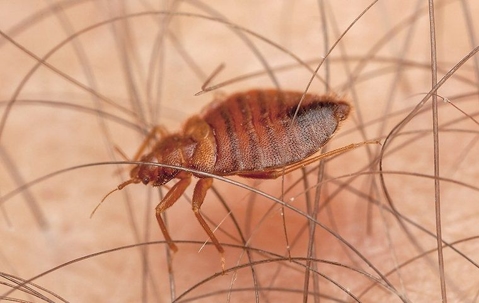Types of Parasite Control: Which Technique Is Right for Your Infestation?
When confronted with a pest infestation, the option of an ideal approach for pest control is critical in effectively managing the circumstance. From chemical therapies to biological services, there exists a series of strategies that can be utilized to attend to various types of insects. Each approach features its own set of considerations and advantages, making the decision-making process a nuanced one. Comprehending the subtleties of each technique and reviewing their compatibility with the particular bug invasion handy is crucial for achieving long-lasting success in parasite management. By discovering the numerous sorts of pest control techniques offered, people can make educated decisions tailored to their unique conditions, ensuring a more lasting and effective result in pest elimination.
Chemical Pest Control
Chemical bug control entails making use of synthetic or naturally obtained chemicals to take care of and eradicate pest populations efficiently. This approach is commonly utilized in agriculture, forestry, and domestic setups to deal with a wide variety of insects, including bugs, rats, and weeds. The use of chemical pesticides can provide quick and targeted services to pest invasions, making it a prominent option for lots of individuals and services.
One of the essential advantages of chemical insect control is its capability to swiftly eliminate insects, decreasing the risk of damage to plants, building, and human wellness. By making use of certain chemicals that target specific insects, this method can effectively control problems while decreasing injury to helpful microorganisms and the atmosphere when applied correctly.
Nonetheless, using chemical insect control also elevates problems regarding potential adverse results on non-target varieties, water resources, and human health. It is important to adhere to safety and security standards, use chemicals properly, and take into consideration alternative pest control techniques to lessen these threats and ensure lasting bug monitoring methods.
Organic Bug Control
Biological insect control, likewise recognized as biocontrol, utilizes living organisms to reduce and manage insect populaces normally. By making use of the pest's natural predators or pathogens, biological insect control uses a sustainable and ecologically friendly option to pest administration.

Mechanical Pest Control
Making use of physical and hand-operated approaches to handle insect populaces, mechanical insect control offers a different method that does not rely upon making use of living organisms or artificial chemicals. This method includes using obstacles, traps, or various other devices to physically deter or remove pests. By obstructing pest entrance points or setting up catches to catch them, mechanical bug control can efficiently lower infestations without presenting chemicals into the atmosphere.
One usual example of mechanical bug control is the use of mesh screens on doors and windows to avoid insects from getting in buildings. This easy yet efficient technique works discover this as a physical barrier, maintaining pests out while enabling appropriate ventilation. Additionally, devices like mousetraps, fly swatters, and ultrasonic repellents fall under the mechanical bug control category.
While mechanical insect control methods can be labor-intensive and call for regular surveillance and upkeep, they supply a lasting and eco pleasant option for managing pest infestations. By integrating various mechanical strategies, homeowner can develop a comprehensive insect control approach that lessens dependence on chemical pesticides.
Physical Pest Control

Some common physical parasite control methods consist of using obstacles such as internet or displays to avoid pest access, traps to record and remove pests, and hand-picking to physically eliminate insects from plants or frameworks. Furthermore, methods like heat therapies can be used to manage pests like bed insects by elevating the temperature level to degrees that are lethal to the insects.
Physical insect control is specifically helpful in incorporated pest administration (IPM) approaches, where numerous parasite control methods are incorporated for efficient bug monitoring while reducing the use of chemicals. By utilizing physical insect control strategies, people can successfully deal with pest invasions with minimal environmental effect.
Integrated Parasite Monitoring
When executing physical bug control methods as component of pest monitoring strategies, Integrated Bug Administration (IPM) becomes an extensive approach that leverages different methods to successfully regulate pest populaces. IPM concentrates on lasting avoidance of insects through a mix of biological, social, physical, and chemical tools tailored to details bug problems. By integrating multiple control tactics, IPM aims to decrease the dangers related to insects while likewise decreasing reliance on chemical services.
One key element of IPM is the emphasis on surveillance and assessing pest populaces to identify the most proper control methods. This aggressive method permits for early treatment and targeted strategies, leading to extra effective pest monitoring. Furthermore, IPM promotes eco-friendly practices by prioritizing non-chemical control methods and just making use of chemicals as a last resort.
Verdict

By utilizing the insect's natural predators or pathogens, biological insect control provides a lasting and eco pleasant service to pest administration. - Kings pest control cincinnati oh
Making use of physical and hands-on methods to take care of bug populations, mechanical insect control provides an alternative strategy that does not depend on the use of living microorganisms or artificial chemicals.An effective strategy to handling parasite populations without relying on chemical or organic techniques entails the usage of physical pest control strategies.When executing physical insect control approaches as part of pest administration techniques, Integrated Parasite Administration (IPM) emerges as a thorough technique that leverages various methods to effectively regulate pest populations. Chemical bug control involves the usage of pesticides, organic pest control uses all-natural predators, mechanical parasite control involves physical obstacles, physical pest control consists of capturing or eliminating parasites, and integrated pest administration combines several approaches for a holistic technique to pest control.